Energy policy is likely to be an important issue in the upcoming Ontario election and voters are restless. Significant uncertainties exist in the public’s mind, no party has a clear advantage on the energy file, and new factors seem to be driving public perceptions. With an election set for October 4, 2011, the stakes are high and political actors from all the major parties are expected to become heavily engaged in energy policy in the next few months. With this in mind, APPrO set up the concluding event at its annual conference as an armchair discussion on how political issues are likely to impact electricity policy in the coming year.

APPrO invited five policy experts to table their concerns and expectations. Where is politics expected to drive energy policy and what can be done to make sure the electoral process produces reasonable results in terms of manageable policy?
Moderated by Sean Conway, an energy historian and a former member of the provincial legislature, the session featured Greg Lyle of the Innovative Research Group Inc., Adam Radwanski, a political columnist with the Globe and Mail, and three policy experts: Satinder Chera of the Canadian Federation of Independent Business, Will Stewart of Navigator Ltd., and Rob Silver of Crestview Public Affairs.
Greg Lyle began by releasing the results of a new opinion poll conducted for APPrO. Based on a recent telephone survey of Ontario residents, his research compared how Ontarians’ views on key energy matters have changed over the past decade. Key findings include the following:
• While Ontarians’ support for the Ontario’s two major parties has remained quite close over the past decade, with a plurality flipping back and forth between the two parties, it masks a more interesting trend. In the Mike Harris government of the 1990’s, 70% percent of Ontarians would identify either the Liberals or Conservatives as the party they would support. After the Health Premium was introduced in Ontario, support for the two major parties dropped to about 60%. In the past year, this kind of committed support has dropped to about 50%. So, as things currently stand, the fact that half of Ontarians support some other party presents an opportunity for almost any of the major parties to advance their agenda and to gain electorally.
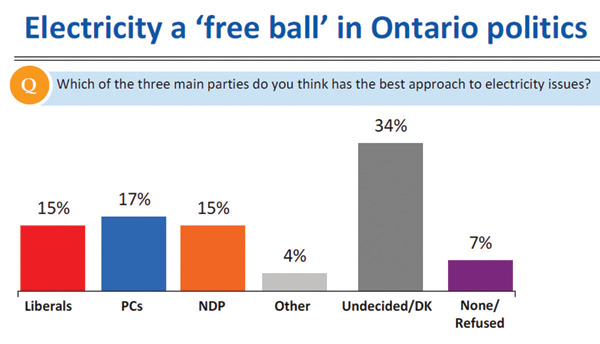
• With respect to the energy portfolio, the NDP do best. No party owns this issue. Even among those who support the Liberals and Conservatives, the NDP are considered to have a more tenable position on energy.
• Being exposed to time-of-use pricing makes no difference to people’s views of provincial energy policy or the government’s performance on this matter. Forty-four percent of people think the Liberals have made matters worse with respect to electricity since being elected; only 22% say “better”. The large unknown or undecided in fact represents a growth opportunity for the Liberals. Looking at it a different way, less than half of Ontarians think the Liberals have made matters worse.
• More than half of Ontarians think demand for energy is going up. The regional distribution of these views correlates with those regions where in fact the demand for electricity is in fact going up.
• If asked whether they prefer a power line or generating facility to meet growing electricity demand, 20% said neither. That said, most people prefer generation over transmission. That preference increases outside the GTA.
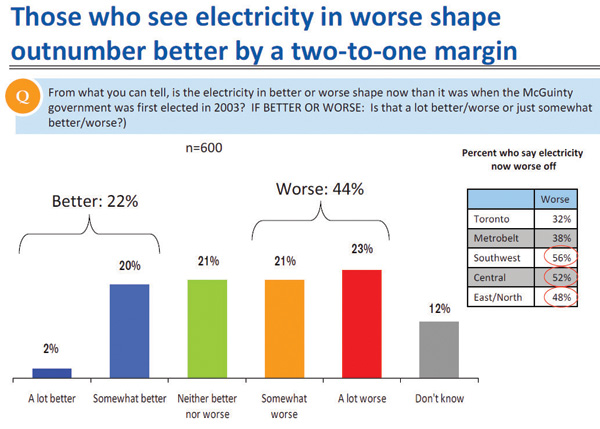
• Generally, people support the broad objectives of the current government with respect to the energy issue – thinking it all is important, i.e., greening the supply mix, replacing aging infrastructure, and building new generation.
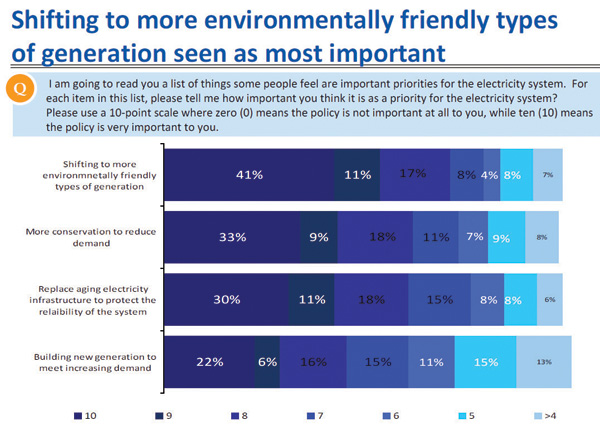
• However, when asked if they would be willing to absorb a 5%, 10% or 15% increase in their electricity bills to pay for these system improvements, support remained limited irrespective of the posited increase. Interestingly, those who were more willing to absorb a price increase would tend to vote Liberal. Those who were uncertain about a price increase were also uncertain in their political affiliations. For those somewhat opposed to an electricity price increase, they would still vote Liberal. Only those who strongly oppose any price increase would vote Conservative, by a margin of 2 to 1.
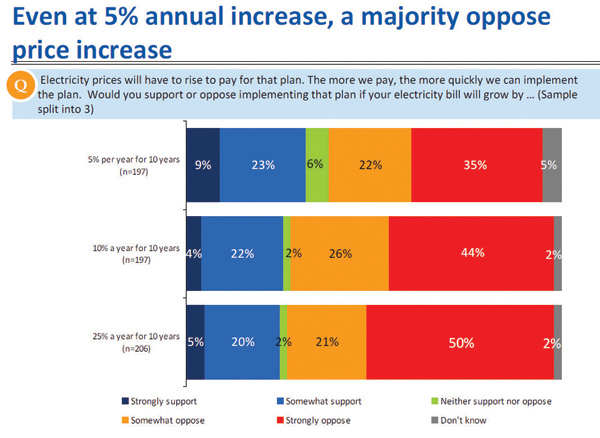
• In spite of the government’s recent actions (i.e., cancellation of new generation in Oakville and the announcement of short term rate rebates), Mr. Lyle suggested there is a significant opportunity to convince those who are uncertain or somewhat opposed to price increases that they are necessary to keeping the lights on. However, the government’s most recent actions suggest they don’t have the courage or conviction to take on that debate directly during an election year, and have instead decided to temporarily moderate electricity price increases.
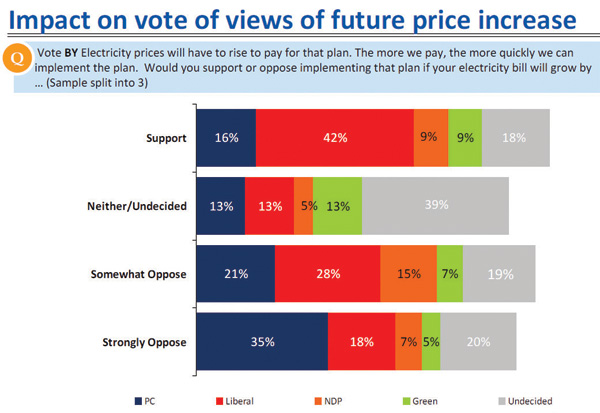
Adam Radwanski expressed concern about the sustainability of an anticipated plan, expected to be announced shortly by the Ontario government, that would effectively subsidize electricity rates on a temporary basis. (Specifics of the plan were confirmed within days of this panel discussion, and to no one’s surprise, a 10% rebate on power prices was announced. (See page 21, second column, for more on the Ontario Clean Energy Benefit. Story begins on page 19.) Mr. Radwanski commented that such political intervention, while questionable, is preferable to the more panicked approach taken by the previous Conservative government in 2002, when it completely reversed itself on its plan to rely on market pricing and imposed a price freeze. That said, Mr. Radwanski observed that the rebates expected to come from the current government are a bit of an admission of defeat.
More broadly, Radwanski sees a tacit admission of failure in the sense that the current government has not managed to have an adequate conversation with Ontarians about the cost implications of maintaining a stable power system. In particular, the government has actually allowed the misconception that the cost increases are entirely about green energy to take hold. “Had it explained that costs had to go up just to upgrade a system that had been long neglected, and that otherwise the supply would be jeopardized and/or costs would go up to an even greater extent in the future, people might have found the increases a little less jarring.” In some respects, the decision to move Brad Duguid into the energy portfolio is recognition by the government that it needed to provide more straightforward messaging in terms of the direction energy policy has been taking. He appears to be tasked with focusing on why the current program and the actions taken to date have been positive steps in the right direction. However, the expected rate rebate is a kind of admission that the government’s effort at improving its messaging with respect to the energy portfolio has not been entirely successful.
Radwanski suggested that with the provincial election period upon us, there is not likely to be a deep or meaningful debate on electricity policy. It is in no party’s interest to get into a discussion of how or why electricity rates should or should not increase. Clearly no party is going to be jumping up to criticize the government for cutting back electricity rates.
Unfortunately, over the next year, in what amounts to a pre-election “fantasy land,” we’re going to be hearing more of “you can get more for less money.” This won’t serve as a sound basis for provincial energy policy. While there has been some effort to distance energy policy from politics, whatever the outcome of the election, Mr. Radwanski was of the opinion that no political party was going to move to dramatically change the course the energy sector is now on.
Satinder Chera outlined concerns arising from the important but often overlooked perspective of small and medium businesses. They are significant consumers of electricity. He presented data suggesting that the small independent business sector has been largely an afterthought in the development of energy policy to date. The SME sector represents 94% of all businesses in Ontario and it continues to grow, even through the recession. In a recent survey of more than 3000 small business owners, he found that:
• Nearly two-thirds of those polled were pessimistic about the direction of the economy.
• There is growing concern about the rising cost of energy.
• Compared to a range of other issues, concern about how the government is handling electricity prices ranked second highest (82% indicated “poor”). This is indicative of a “perfect storm” of related events: The imposition of the HST onto power bills, the introduction of smart meters and Time-of-Use rates, the costs of the green energy program, and the shifting of costs from large industrial consumers and residential consumers to small business. The electricity price freeze introduced in the summer of 2002 was probably the first time any government recognized the challenges small business was facing with respect to energy prices.
• Two-thirds of those polled indicated that over the past three years, their energy usage had gone down or remained the same. However, more than 80% indicated that they had seen an increase in total costs over that same period – in spite of their best efforts to implement energy conservation.
• The government’s efforts to encourage energy conservation are not well attuned to the circumstances small businesses face. Over 92% of those polled indicated they couldn’t shift their load from on-peak to off-peak hours thereby leaving them totally exposed to the rate impacts of Time of Use pricing. While there are some programs available to small business, e.g., Power Saving Blitz, 72% of those polled were unaware of this program.
• Eighty-four percent of small businesses would support the use of tax credits to help them deal with the electricity increases they’ve experienced.
• In terms of the factors that would influence members’ votes in the upcoming election, electricity pricing was in the middle of the pack.
Will Stewart, who has been an energy advisor to previous Conservative energy ministers and to the private sector, began by reflecting back to the debate in the Ontario Legislature that surrounded the government’s move to freeze electricity rates in 2002. He noted that it is similar to the circumstances surrounding current expectations for publicly funded rate relief, a case of “welcome back to the future”.
The massive increases in electricity prices that have been discussed in the media really haven’t occurred yet, but potential price increases seem to be increasingly dominating the discussions and debates surrounding on energy issues. A range of events and media coverage leading up to next year’s provincial election can be expected to mirror those experienced in the lead up to the 2002 provincial election. The question is, “knowing this, what is this sector going to do to mitigate this?” Clearly, the anticipated price cutting is not likely to be the last shoe to be dropped in this debate. So to the question of whether there is politics in the energy sector, Mr. Stewart emphasized there always has been politics at play, and it will remain so. The challenge for those in this room is to realize that good politics may not mean good policy and that this sector needs to figure out how to work with – and in – that political reality.
Rob Silver, an energy policy consultant with Crestview Public Affairs, and one of the McGuinty government’s key advisors on energy policy in its first term, organized his remarks around five main points:
• The world is coming to an end
• There is nothing you can do about it
• Like most life issues, you can look to the Simpson’s cartoon for guidance on why we’re facing these issues
• My great fear
• There is hope.
Mr. Silver explained why he says that the world is coming to an end: When energy policy becomes an election issue, bad things are in store for the energy sector. When energy issues become a hot potato, it creates instability that is bad for business and tempts political leaders to come out with short term promises that create longer term problems. That’s where we find ourselves now, which leads to his second point that there is nothing we can do about it.
Silver believes that the government has made green energy a “sword” issue and while some may want to quibble about the communications around that, the die has been cast. While the opposition is not likely to let this issue go away, the government does have a lot to be proud of in terms of its record on energy policy. While comparisons have been made to 2002, this is a very different world. Billions of dollars have been invested to date, unlike the circumstances in 2002.
Mr. Silver invoked an episode of The Simpson’s where the inconsistent views expressed by a group of children in a focus group frustrated a group of producers trying to design TV programming. Drawing parallels with the current state of energy policy in Ontario, Mr. Silver suggested that policy experts need to better understand the apparent contradictions in public opinion.
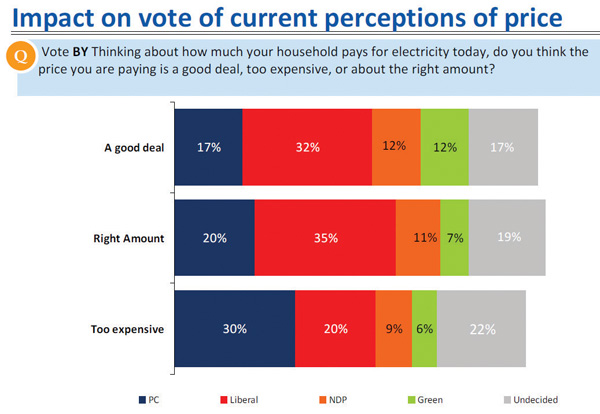
Polling shows that support for all forms of green energy are “off the chart”. It’s interesting that none of the political leaders are running against the closing of coal-fired generating stations. Even support for nuclear energy is extremely high. Mr. Silver postulated that the wider public does not feel threatened by the prospect that a new nuclear project might be developed in their community. And for those communities where such a facility might appear (i.e., near Bruce, Darlington), these are communities with a vested interest in the nuclear industry.
However, when it comes to price, Mr. Silver returned to his Simpsons analogy to suggest Ontarians are like those apparently inconsistent kids, because support for new investment falls off. It is clear that things like five cent charges for plastic bags, other municipal charges, and events surrounding the emergence of the Tea Party in the US reveal a widespread displeasure with the ruling elites that is going to play itself out over the months leading up to the provincial election.
Mr. Silver said his greatest fear is that a new Conservative energy minister will think that the answer to all the rhetoric that surrounded the debate on energy during the pre-election period will be to develop an all-new energy plan, and to strike a task force to reconstitute the whole energy sector in order to address the issues on which the Conservatives had been criticizing the current government. That could be very destabilizing not just because of the potential changes to the system, but because of the extended period of indecision that could result while a wide range of options are being considered.
Mr. Silver noted that his primary criticism of this government has been the lack of stability. Not only have there been seven ministers over the past seven years, but there have also been seven Deputy Ministers. This led to his final point or hope: “I hope, regardless of who wins the election, that some boring minister is appointed to the portfolio – someone who is not trying to make a name for him or herself, not trying to make history, but just trying to do the right things, day by day.” A lot of people in the energy-sector audience seemed to agree with Mr. Silver on this last point.
Mr. Conway asked the speakers to indicate, after considering the polling data, whether it is correct to assume that there is a great deal of danger in the apparent “conflictedness” in people’s opinions/concerns about the sector.
Mr. Lyle said that in his view the government has not yet told the whole story at any one time. The government has focused its story on reliability, then on green issues, followed by jobs, and, now on price. But it has never talked about all these issues together and never, until now, with any reference to the cost implications. Not surprisingly, this created an impression that all these energy sector developments could be achieved without cost implications. There hasn’t even been a discussion that even new traditional power would cost more than old traditional power.
Mr. Conway asked whether it is fair to say that those who support the green agenda are not prepared to speak openly about the cost of it. Mr. Silver responded saying that we should have leaders forthright enough to have that kind of “adult” conversation with the public. However, we just don’t seem to see that in Ontario or elsewhere. It could be that the public is just not ready for such a discussion.
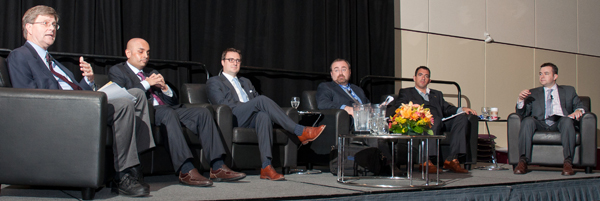
Mr. Conway asked Mr. Radwanski, considering the recent setbacks for climate change legislation in the US, whether Ontarians should conclude that given the economic times we find ourselves in that there is little support for the green agenda. Mr. Radwanski agreed that is true. It’s not only in energy, but the broader anti-incumbent movement that seems to be expressing itself, most particularly with respect to matters that may affect peoples’ pocket books.
Mr. Chera noted that, frankly, his members would appreciate some more honest talk from government. When asked if they felt they were getting the “straight goods” from their provincial government, 89% indicated “no.” There is a distinct impression that the government is saying one thing and yet acting entirely differently. While his sector generally supports the idea of green energy, rising costs are leading many to wonder what ever happened to the argument that “conservation” will lead to lower prices. If the government is still committed to this agenda then it needs to be more forthright in what this is going to cost taxpayers and consumers, he said. A few days after the APPrO Conference, the Finance Minister’s Fall Economic Statement included measures to help consumers, including small businesses, with their rising hydro bills. While not a permanent solution, CFIB did credit the Minister for responding to its members concerns.
Will Stewart emphasized that as an industry there is a need for government to be forthright in what the green initiatives and new capacity are going to cost.
Mr. Radwanski suggested that public perceptions on cost are skewed and exaggerated. However, the government has brought the problem on itself by not having addressed this more clearly as it moved to strengthen and upgrade the existing power system.
A question from the floor asked why any right-thinking Premier or Minister of Energy wouldn’t want to find a way of getting out of the electricity business. And, if they would, how would they do that? Mr. Silver responded, saying “You can’t put the genie back in the bottle.” It is difficult if not impossible to imagine how we might get to the fully deregulated world that was contemplated back in 2002. The idea of a deregulated or privatized electricity market is not in the public consciousness at this point.
Both Mr. Stewart and Mr. Radwanski responded to a question from the moderator about whether politics and policy are being adequately separated. Mr. Stewart observed that there is a big difference between rolling back the role of politics in the system and fully deregulating. You can run a regulated system with a whole lot less political intervention and government directives than there is now. There are agencies in place with the rules and transparent checks and balances to enable politicians to stand back and let the system operate as designed.
Responding to the same question, Mr. Radwanski noted that he has trouble separating the Oakville decision from the electoral politics in the directly affected ridings. That said, there seems to be a great deal of concern across the province about the Green Energy Act and the fact that it has removed municipal controls over the types and locations of energy developments in peoples’ communities.
Mr. Lyle suggested that the recent decision in Oakville is an old story, just retold. Oakville was a situation where people had a problem they weren’t talking about. Without discussing the problem, the opposition reframed the issue in terms of a referendum on one solution. It never was developed as a question of how you meet the energy needs of Oakville but rather whether residents wanted one more emitter in their vicinity. The answer to that was “no.”
He thinks the discussion needed to back up one level to first get agreement on the need then discuss the forms in which that need could be met, i.e., new transmission or generation. If we want power lines then what are we prepared to pay for them. The discussion needed to be refocused, more in terms of the least objectionable alternative.
Clearly all the political parties have some work to do in devising meaningful policy proposals in advance of the next election, and in communicating the underlying reasoning to an increasingly skeptical public.
Story by Art Krause and Jake Brooks
